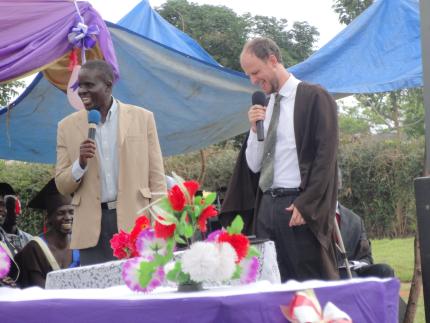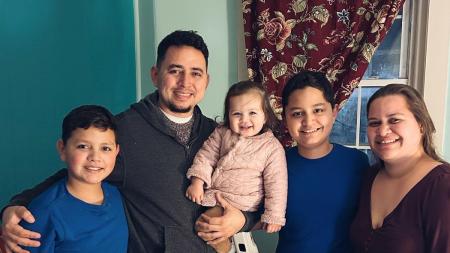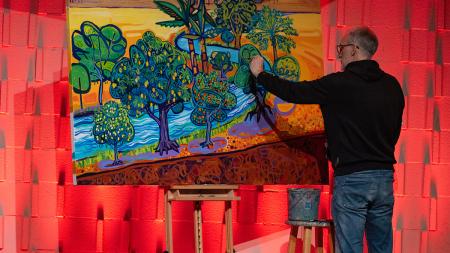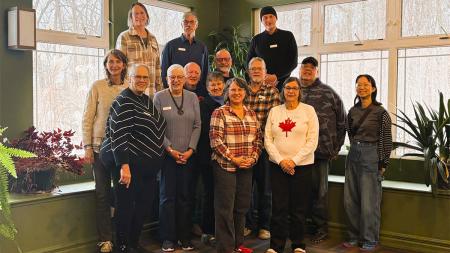TLT Graduates Celebrate in Uganda

Anthony Sytsma (right) shares a laugh during the graduation ceremony.
After many of the Timothy Leadership Training (TLT) graduates received graduation certificates in mid-January, their friends and family burst into cheers, surrounded them, and began to dance.
In some cases, friends and family even hoisted graduates on their shoulders and paraded them around the area where they held the ceremony in the small community in northwestern Uganda.
"When we gave out the certificates, there was so much cheering and yelling that it was hard to keep track of what was going on,” said Rev. Anthony Sytsma, a Christian Reformed minister and the TLT master trainer who oversaw the training for more than 100 church leaders in three separate locations of the country.
“But it was so great to see [the graduates’] joy and the support of their family members. This was such an important thing for them and their families that they had accomplished the training.”
Click here to watch a World Renew video about the celebration.
The TLT training, which consists of six modules, took place over a one-and-a-half-year period in Uganda. Participants met for a week every three months.
Towns where the training occurred included Amuria and Katawi, as well as Kaberamaido, where the church leaders — dressed in caps and gowns — gathered for the graduation ceremony.
Many of the church leaders who underwent the training are members of the Pentecostal Assemblies of God in Uganda. Serving some 30 churches, most had no formal training for their ministries before becoming part of the TLT program, which is international in scope and based in Grand Rapids, Mich.
“Almost none of the church leaders have been to Bible college,” said Sytsma. “Many worked in very remote places. Some of them had to travel quite a distance on bicycles to get to the training.”
With the help of other trainers, Sytsma led them through TLT educational modules that taught such subjects as pastoral care, financial stewardship, addressing abuse in families, caring for God’s creation, preparing worship services and preaching, and teaching Sunday school.
“In general, we spoke about how they can have an impact on their community,” said Sytsma.
TLT, which has been in Uganda for a decade, is a grassroots, ministry training program that has about 1,500 trainers who work in more than 20 languages and 50 countries around the world, said Stephen Tuuk, chief executive officer of TLT.
TLT is recommended for support by the CRC. It is also used as a training tool in some of the church’s overseas work.
“TLT gives people a framework and outline and a way to be effective pretty quickly,” said Tuuk. “About 85 percent of church leaders in the less developed world are untrained, and this gives them tools to minister in their own congregations.”
“One of the hallmarks of TLT is that it is sustainable and can be replicated,” said Tuuk. “TLT trains trainers who in turn train others.”
The graduation ceremony in Uganda was unusual. Normally, the number of trainees receiving certificates in a given area isn’t so large, he said, although another large graduation ceremony did happen last year in the Dominican Republic.
Sytsma was in Uganda working for World Renew, mainly in order to use TLT to train church leaders. His wife, Sara, served as an agricultural specialist for World Renew. Both are graduates of Calvin Theological Seminary. Later this year they will move to Kenya, where Sytsma will teach in a Bible college and his wife will continue her agricultural work.
A key component of each TLT training session, said Sytsma, is the requirement for each participant to come up with an action plan, which is a project or activity they aim to accomplish before they return for the next session.
In one of the three groups, two of the trainees said they would return home and, with help from others, clean the local health clinic.
“They cleared litter, cut down the grass, washed the walls and cleaned the latrines,” said Sytsma. “It was one way they could show they cared for the sick.”
Another trainee said that his church services tended to go too long, in part because people came late. This meant, in the case of of several women, that they would return home late and their husbands would be angry, wondering where they had been, and in some cases would abuse their wives.
So the pastor worked hard to start the service on time and end it in time so that the women could be back home when they had planned to be.
This worked well, and a couple of the husbands grew intrigued with the church, started to attend services, and came to faith in Christ, said Sytsma.
“It was amazing to hear all of the stories from the leaders and of how God used them,” said Sytsma. “Their stories challenged me in my walk with Christ to think about how I can intentionally impact people’s lives.”
Near the end of the graduation ceremony, the trainers washed the feet of the church leaders, symbolizing the time when Christ washed the feet of his disciples, showing how he was their servant and asking them to do the same to others, said Sytsma.
“As the trainers sacrificed to train the graduates, so the graduates should also go out to serve and train other church leaders,” said Sytsma.
“Many of them were very impressed when we washed their feet. As Peter was at first ashamed to have Jesus wash his feet, so, I think, were many of my students to think of their teachers washing their feet, but it turned out to be very meaningful for them.”
Some of the men whose feet he washed got choked up. Tears filled their eyes to see their leaders, two bishops in the Pentecostal Church of Uganda, have their feet washed.
“My hope is that this little ceremony helped to make people realize that we are all equal, whether Ugandan or American, and there is no reason I shouldn't be serving them,” said Sytsma.
Each graduate had their feet dried with a new towel that they were then given to take home. Each towel said "Timothy Leadership Training" on it.


